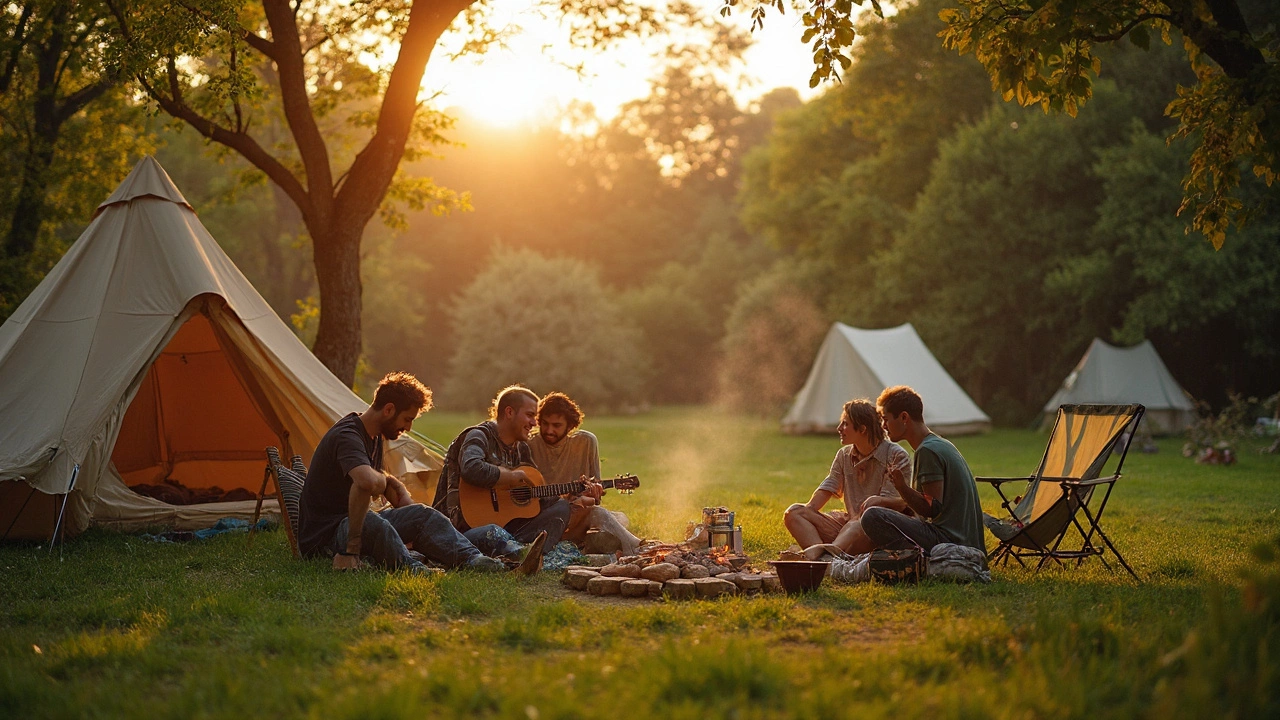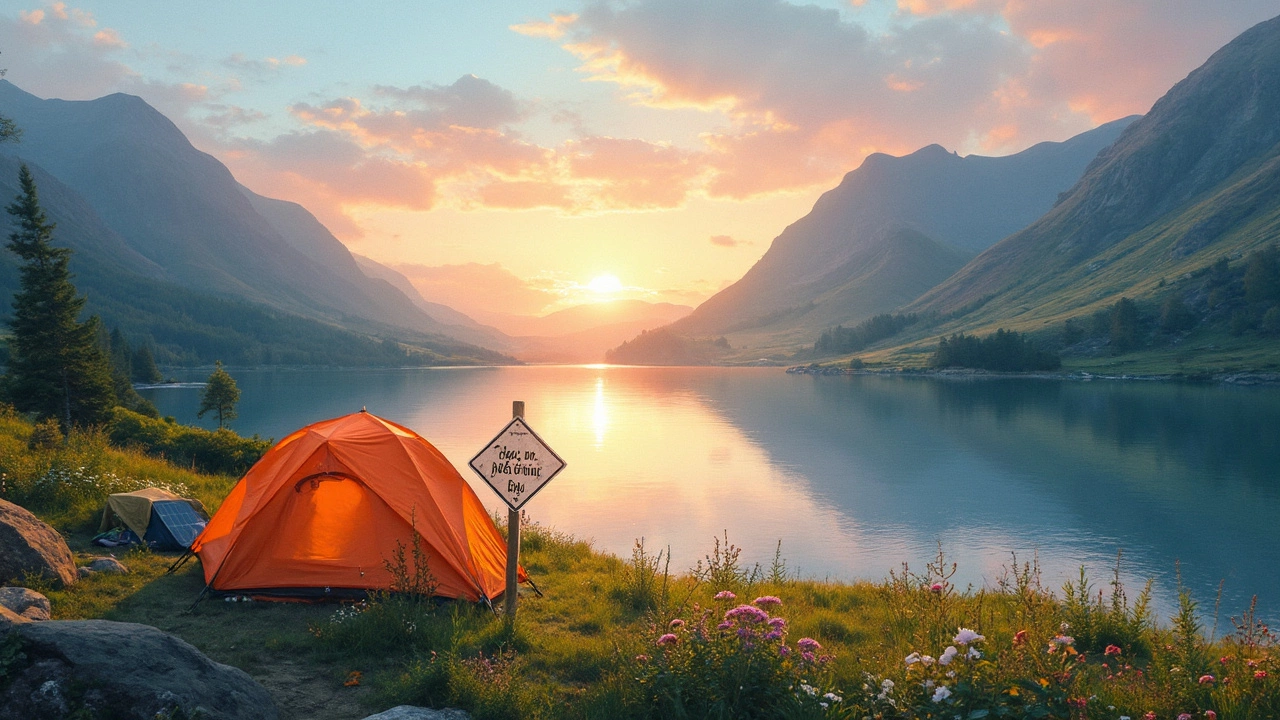The Golden Rule of Camping: Mastering Eco-Friendly Adventures
 Apr, 13 2025
Apr, 13 2025
Ever packed for a camping trip only to find you've brought enough stuff to survive a zombie apocalypse? Believe me, I've been there. But when it comes to camping, the golden rule isn't just about managing your gear—it's about appreciating and protecting Mother Nature.
The essence of eco-friendly camping is leaving no trace. This means when you wander into the wilderness, leave it as pristine as you found it. Think about it as an outdoor version of 'take only memories, leave only footprints'. It's about respecting the land, the wildlife, and ensuring that future campers can enjoy the same breathtaking sights you do.
Now, packing smart is a game-changer. Swap disposable for reusable. Think of things like water bottles, cutlery, and even solar-powered gadgets. It not only lightens your load but shows a whole lot of love to the planet. Plus, local wildlife won’t be munching on your forgotten wrappers, which is a win-win for everyone.
- Embrace the Leave No Trace Principle
- Packing Smart and Sustainable
- Finding Eco-Friendly Campsites
- Being Water and Energy Wise
Embrace the Leave No Trace Principle
So, you're out there, surrounded by towering trees and whispering winds. The last thing you want is to ruin the vibe with leftover trash or trampled plants. This is where embracing the Leave No Trace principle comes into play. It's all about minimizing our impact on the environment and letting nature do its thing unhindered.
The Leave No Trace Center for Outdoor Ethics has set up some easy guidelines to follow, which help protect our natural playgrounds. According to them, "Leave No Trace is not a set of rules or regulations. It’s an awareness, an attitude, an ethical obligation."
- Plan Ahead and Prepare: Know the regulations and special concerns for the area you'll visit. Weather check? Done. Map at the ready? You bet. This way, surprises won't lead to bad decisions.
- Travel on Durable Surfaces: Stick to the trails, and if you're going off-trail, choose durable surfaces like rock or gravel to minimize damage.
- Dispose of Waste Properly: Pack it in, pack it out—simple as that. If you brought it with you, take it back home, including your trash and food scraps.
- Leave What You Find: Those wildflowers look gorgeous, don't they? Best admired and left for others to enjoy, too.
- Minimize Campfire Impact: Use a camp stove instead of a fire pit when possible. If a fire must be made, keep it small and use established fire rings.
- Respect Wildlife: Observe from a distance and avoid feeding, which can lead to animals losing their natural fear of humans.
- Be Considerate of Other Visitors: Keep the noise down, respect others' camping or hiking experiences, and yield to uphill hikers.
Embracing these principles isn't about being a camping buzzkill. It's about giving back to the places that give us so much. So, the next time you pitch that tent, do it with the planet in mind. You'll enjoy the trip even more knowing you're a proud protector of the great outdoors.
Packing Smart and Sustainable
Alright, let's chat about how to pack smart and keep things eco-friendly. You know the drill—less is more, especially when you're trying to tread lightly on the planet. First off, ditch the single-use items for ones you can use again and again. Think reusable water bottles instead of stacks of plastic ones. Trust me, it makes a huge difference.
When you're planning meals, be a champ with food storage. Reusable containers are not only better for the environment but also for keeping your food fresh. Plus, they prevent pesky leaks in your bag—nobody wants oatmeal in their socks!
- Use biodegradable soap for washing dishes and yourself. It's kinder to rivers and lakes.
- Instead of paper towels, bring along a few cloth towels you can wash and reuse.
- Solar chargers are your best friends here. They keep your gadgets going without draining the planet.
- LED lighting is energy efficient. Get yourself a good headlamp—they are hands-free and last longer.
Now, for the eco-conscious adventurers, consider gear that aligns with your values. Look for tents and backpacks made from recycled materials. They’re sturdy enough to handle your escapades and give a new life to plastics.
If you're curious about stats, here's a nugget: An average family of four uses over 400 single-use plastic water bottles per year. You can cut that drastically by switching to reusables.
By packing this way, you’re not just prepping for a trip; you’re making a small but meaningful contribution to the planet. When each of us does our part, camping becomes as much about the journey as it is about leaving a better world behind. Happy packing!

Finding Eco-Friendly Campsites
Choosing the right spot can make all the difference when you're camping with sustainability in mind. And guess what? There are actually eco-friendly campsites that make this mission even easier. These places often prioritize green practices, like using renewable energy and promoting recycling.
When hunting for such campsites, look for ones that have environmental certifications. These certifications, like those from Green Key or EcoCamping, assure you that the site follows sustainable practices. They may utilize solar panels for energy, collect rainwater for reuse, and offer proper waste disposal systems.
Next up, location scouting. Pick campsites that are close to home, if possible, to cut down on travel emissions. Bonus points if you can get there by public transport or carpooling with friends! Also, consider places that promote biodiversity and have measures to protect local wildlife habitats.
Eco-friendly campsites often have clear rules about campfires, such as bringing your own firewood to prevent deforestation. These rules are not just to nag you, but to keep our forests healthy.
Here’s a small table with some top-rated eco-friendly campsites you might want to check out:
| Campsite | Location | Special Features |
|---|---|---|
| Sunshine Eco Camp | California | Solar energy, rainwater collection |
| Green Haven | Oregon | Wildlife preservation area |
| Eco Retreat | Washington | Organic gardens, composting toilets |
So next time you plan a trip, remember these tips. It’s not just about where you set up your tent, but also how your campsite supports planet-friendly choices.
Being Water and Energy Wise
While out in the wild, being conscious about water and energy use is like the camping superpower you never knew you needed. Water, especially, is a precious resource. If you're near a water source, remember not to waste it. Stick to biodegradable soaps if you need to wash up, and always make sure you're at least 200 feet away from streams or lakes when doing any cleaning or 'business'.
Purifying water is a must-do if you're in the great outdoors. Carry a reliable water filter or purification tablets. Boiling is another option if you’ve got the means. It’s all about ensuring that you’re sipping safe water without littering plastic bottles everywhere.
Now, let's talk energy. Camping doesn't have to mean total tech blackout. Ever thought about using the sun? Grabbing a compact solar charger can keep your devices alive without the need for any outlets. Plus, it's sustainable and super convenient. If you have to use batteries, consider the rechargeable kind. This way, you're not creating heaps of eco-unfriendly waste.
- Consider solar-powered lanterns instead of disposable or fuel-based ones.
- Invest in a solar-powered stove or oven for those gourmet campfire meals.
- Use energy-efficient LED lights that are both long-lasting and bright.
If you've got an iota of tech involved, like camera gear or phones for those must-capture moments, the solar route really pays off. It gives you the freedom to explore while being a friend to the Earth. Remember to use only what you need. Enjoying nature isn’t about having all comforts of home at your disposal, but more about finding joy in simplicity.